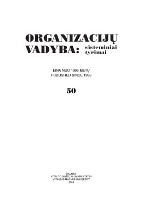Kognityvinio stiliaus reikšmė valstybės tarnautojų atitikimui darbo reikalavimams
THE SIGNIFICANCE OF COGNITIVE STYLE FOR CIVIL SERVANTS’ FIT TO JOB REQUIREMENTS
Author(s): Kristina Švobaitė, Loreta BukšnytėSubject(s): Economy
Published by: Vytauto Didžiojo Universitetas
Keywords: adaptyvus-novatoriškas kognityvinis stilius; asmens atitikimas darbo reikalavimams; valstybės tarnautojai; adaptive-innovative cognitive style; person-job fit; civil servants.
Summary/Abstract: Cognitive style is widely recognized as an important determinant of individual behavior in the psychology literature. An individual’s cognitive style influences individual processes and indicates how an individual organizes information, solves problems and makes decisions. Adaption-Innovation theory posits that each individual has a preferred cognitive style which can be located on a continuum ranking from highly adaptive to highly innovative. Adaptors characteristically solve problems in accepted and tried patterns (“doing things better”). They are generally seen as being systematic, disciplined, consistent, safe and responsible. They tend to proceed within the established paradigm (policies, mores, practices) of organization. Innovators, by contrast, tend to redefine generally agreed problems, separating them from accepted thoughts and paradigms („doing things differently“). They can offer much less expected and probably less acceptable solutions. Because of that, they are generally seen as being impractical, undisciplined and unpredictable. It is important to notice, that cognitive style may be value differentiated, i.e. style describes different rather than better problem solving or decision making processes. Individuals may also perceive their job environment (organization or job) as existing along the same continuum (adaptive or innovative), because the job environment creates “pressure” on each worker to do things in a certain way. In other words, work contexts differ in terms of the information-processing demands placed on individuals. Based on Kirton’s Adaption-Innovation cognitive style theory, this study examines civil servants’ cognitive style and their perceptions of cognitive style required by the job environment. Using Person-Environment ft theory as the theoretical framework, this study examines the ft between these two styles as well as a person-job fit. The aim of this study was to assess the relationships between the civil servants’ person-job ft and cognitive styles (employees’, job environment’s and their fit). The subjects of the study were 168 public service employees. In order to test how cognitive styles (persons style, style of job environment and interaction of them) are related to person-job fit, the regression equation was formed. The employees’ cognitive style and the interaction of employee-job environment cognitive style were of significant predictable value. Regression analysis showed that interaction of cognitive styles is the most important predictor for person-job fit. The results of this study suggest that civil servants, who have adaptive cognitive style and think that job environment requires adaptive cognitive style, possess better fit to the job.
Journal: Organizacijų vadyba: sisteminiai tyrimai
- Issue Year: 2009
- Issue No: 50
- Page Range: 23-35
- Page Count: 13
- Language: Lithuanian

